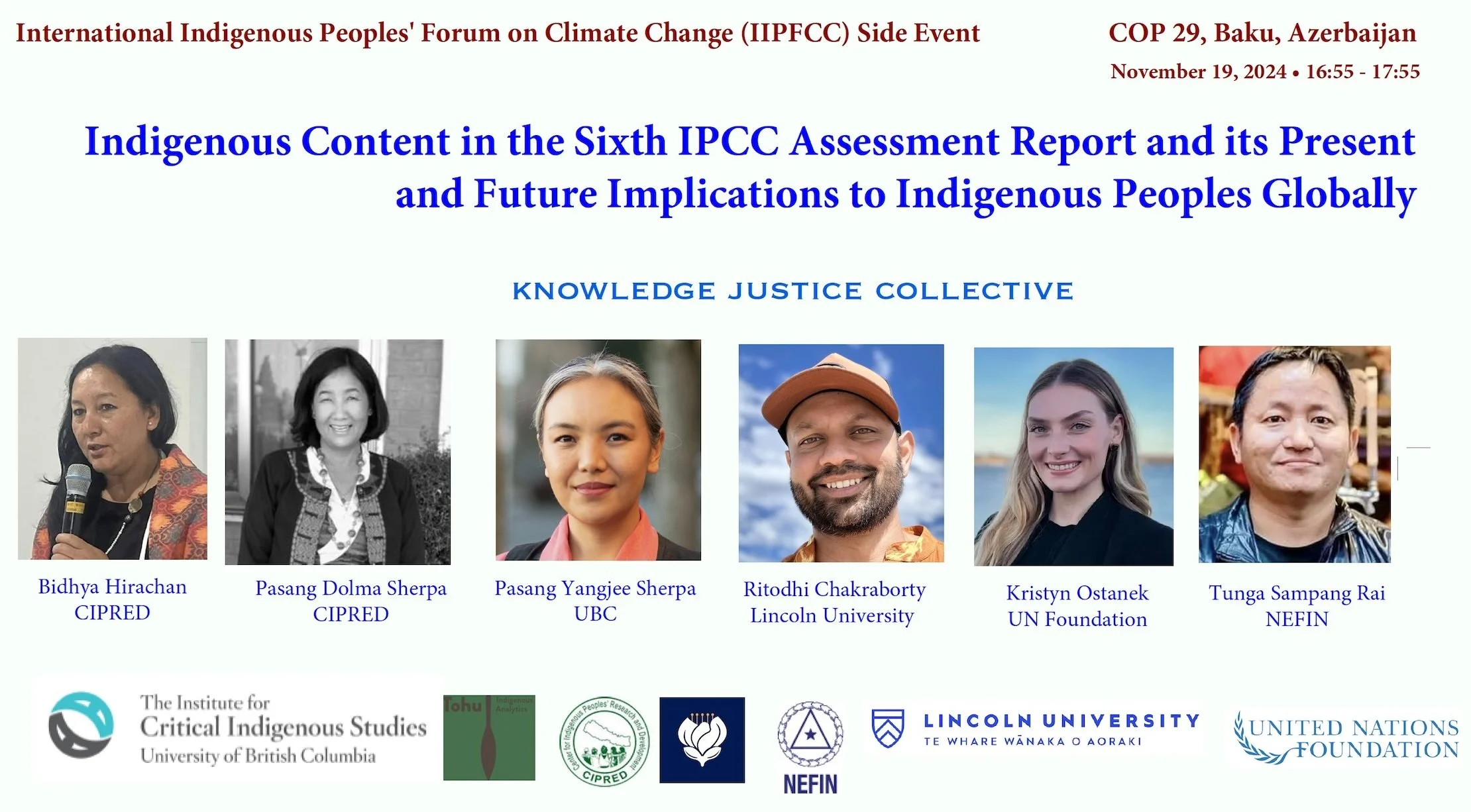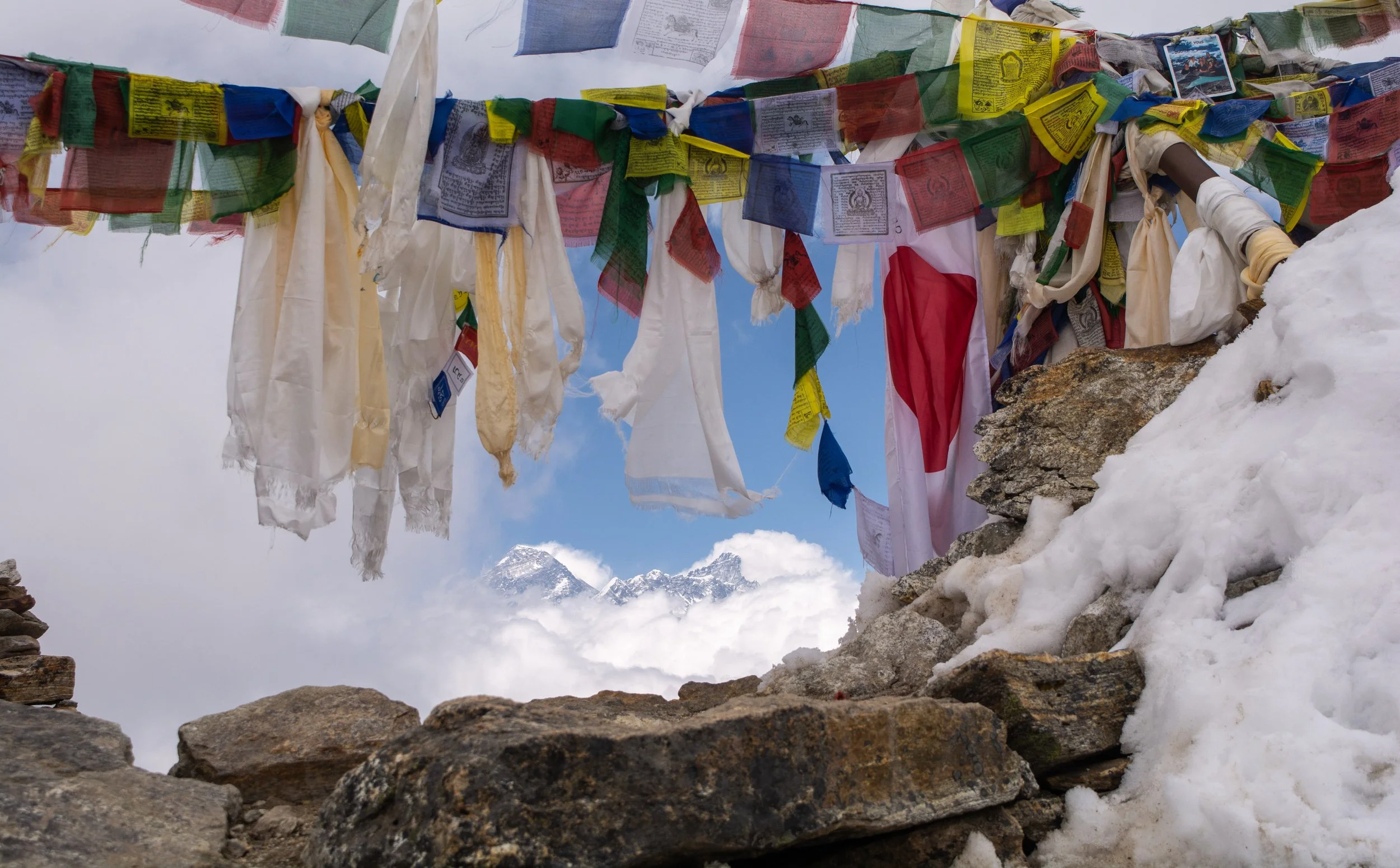Knowledge production is a collaborative process.
I examine human dimension of climate change in the high Himalaya from an Indigenous perspective.
I use multidisciplinary approach in my research projects, and consider plural epistemologies as a necessity, not a choice, in addressing contemporary human problems.
My current research applies community-based approach to exploring the possibilities of collective survival on warming planet. It builds on my nearly two decades of climate change study in the Himalayas and long-term ethnographic study of the Sherpa community at home in the mountains and in the diaspora.
I believe that our sustainability as a Sherpa people in the wake of climate change depends on keeping our songs and stories about people, places and things alive for the next generation.
In picture: Declan, Maicen and Pasang in front of sacred Gokyo Lake, May 2023.
KNOWLEDGE JUSTICE COLLECTIVE
The Knowledge Justice Collective was born out of conversations between Himalayan scholars (2019-2022) Costanza Rampini, Mabel Gergan, Pasang Yangjee Sherpa and Ritodhi Chakraborty on plural climate studies framework for the Himalayas, and between Ritodhi Chakraborty and Pasang Yangjee Sherpa (2022-2023) on critical reflections on the IPCC and Himalayan climate knowledges, with encouragement from our UN Foundation colleague Kristyn Ostanek (2022), following Ritodhi and Pasang’s joint presentation at the IPCC pavilion in COP 26.
The collective seeks to respectfully advance meaningful engagements across knowledge systems. This begins with the recognition of epistemological value of Indigenous Knowledges in solving world problems. Since 2021, the collective has focused on systematically reviewing the IPCC AR6 to identify how Indigenous Peoples and Indigenous Knowledges have been included in this authoritative scientific report on the state of the planet. This led us to collaborate with geographer Eric Nost in further understanding the global landscape of climate knowledge production and the ways in which Indigenous Knowledges have been engaged with. This project has benefited immensely from the research assistantship of students at UBC: Amrit Tamang, Charlotte Taylor, Declan Taylor, Ramudi Samarasakera, Sayano Izu, and Thanh Le.
We are currently working on sharing our findings via publications and presentations. Our first public sharing event was held at the Indigenous Pavilion in COP 29 in Baku. Our first publication appeared in AlterNative: An International Journal of Indigenous Peoples. Pasang sits on the Scientific Steering Committee for the IPCC Committee on Engaging Diverse Knowledge Systems.
Sherpa, P. Y. (2025). Relevance of the Sixth IPCC Assessment Report to Indigenous lived realities. AlterNative: An International Journal of Indigenous Peoples.
Access this article here.
On Indigenous Science:
Stein, S., Ahenakew, C., Valley, W., Sherpa, P. Y., Crowson, E., Robin, T., ... & Evans, S. (2024). Toward more ethical engagements between Western and Indigenous sciences. Facets, 9, 1-14.
Access this article here.
BIODEGRADABLE BLESING
A PROJECT OF LOVE FOR OUR PLANET AND ALL SENTIENT BEINGS…
ANG DOLMA SHERPA, KALZANG DORJEE BHUTIA, AMY HOLMES-TAGCHUNGDARPA, PASANG YANGJEE SHERPA
Lungta (prayer flags) and khata (ritual scarves) materially embody the prayers and blessings that protect life across the Himalaya, and beyond. Important life events are marked with khatas, and ritually important times of the year with lungta. The omnipresence of these materials is possible because of the mass-produced synthetic fabric containing chemical dyes that are readily available and affordable. The widespread use of synthetic lungtas and khatas have replaced the traditional practice of making them with locally-sourced ingredients such as grains, soil, and smoke. The loss of this practice also means the loss of ancestral knowledge of living with the ecological matters that make up the life of a spiritual merit-earning Himalayan person.
Ang Dolma is at the center of this project. Her environmentally-friendly lugta and khata were already gaining traction in Kathmandu, when she connected with Kalzang, Amy and Pasang in 2022. Today, the team is expanding conversation around biodegradable blessing through public-facing essays, prayer-flag making workshops, and educational talks to raise awareness about plastic prayers, ancestral wisdom, and planetary health.
**Read more on how the team has been “Replacing Plastic Prayers with Biodegradable Blessings in the Himalayas” in Sapiens.
Official Bio:
Pasang Yangjee Sherpa, Ph.D. is an Assistant Professor of Lifeways in Indigenous Asia, jointly appointed in the Institute for Critical Indigenous Studies and the Department of Asian Studies at the University of British Columbia. Her current research applies community-centered approach to exploring the possibilities of collective survival on a warming planet. It builds on her longterm ethnographic study of the Sherpa community at home and in the diaspora and her extensive study of human dimensions of climate change in the Himalayas. She previously taught at The New School in New York, Pacific Lutheran University, Penn State University, University of Washington, and Washington State University. Her interviews have appeared in Alpinist, Al Jazeera, BBC, Foreign Policy, PRI’s The World, Newsweek, and BYU Radio’s Top of the Mind among others.



